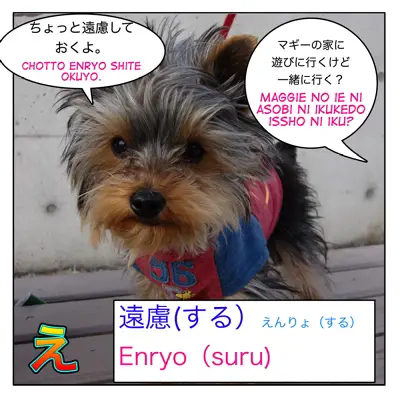「マギーの家に行くけれども一緒に行く? 」
= Maggie no ie ni iku keredomo issho ni iku?
= I’m going to Maggie’s house. Do you wanna come with me?
Cookie : 「ちょっと遠慮しておくよ。」
= Chotto enryo shite okuyo.
= Well, I’d rather not.
皆さん、今日は!(= Minasan konnichiwa! ) Hello, everyone!
Today I will teach you this word, 遠慮する= えんりょする ( = enryo suru)
遠慮 = えんりょ ( = enryo) is a noun.
遠慮する= えんりょする ( = enryo suru) is a verb.
The original meaning is to behave with modesty, to be reserved, to be humble or to hesitate.
For example, when serving snacks or food to guests or offering a present to someone who is reluctant to receive it, you can say:
♦「どうぞ、遠慮しないで下さい。」
= Douzo, enryo shinaide kudasai.
♦「遠慮しないで、どうぞ!」(more casual)
= Enryo shinaide douzo!
= “Please help yourself ! “ “Please don’t hesitate! ”, “No need for formalities!”
♦「遠慮なさらずにどうぞ。」(polite)
= Enryo nasarau ni douzo.
If you want to tell people not to hesitate to ask you a question, you say
♦「遠慮なくおたずねください。」(polite)
= Enryo naku otazune kudasai .
= Please do not hesitate to ask.
♦「遠慮しないで何でも聞いて!」(casual)
= Enryo shinai de nandemo kiite.
= Please don’t hesitate to ask me anything.
If somebody offers you something, you take it saying,
♦「遠慮なく頂きます。」
= Enryo naku itadakimasu.
= Don’t mind if I do.
Meanwhile, if you see someone who is very blunt and says things or receives things without any reservation, you can describe this person by saying,
♦ あの人は遠慮がない(です)。
= Anohito wa enryo ga nai (desu).
= That person has no reservation.” (literal meaning)
Of course, we would never say that in English, but you might say, “He/She sure has a lot of nerve.” Or you might sarcastically say, “He /She sure is shy.”
Sometimes you say jokingly to this kind of person,
♦「ちょっと、遠慮したら!」
= Chotto enryo shitara!
= Be more considerate to others!
Now, please take a look at the picture for today.
Someone asked Cookie if he wanted to go visit Maggie and Cookie didn’t want to go so he declined saying,
ちょっと遠慮しておくよ。
= Chotto enryo shite okimasu.
= I would pass.
Note: ~おくよ( = okuyo) is for male speech.
Both men and women can say
ちょっと遠慮しておきます。
= Chotto enryo shite okimasu.
= Thank you but I would pass.
It means “No thank you.” in a kind of roundabout way.
「ちょっと」( = chotto) is “a little” but it is used when you don’t want to say things too clearly. It makes things sound softer.
Ex. ちょっと困ります。
= chotto komarimasu.
= I am in trouble. or This is a problem. (Don’t trouble me.)
Ex. ちょっと出来ないです。
= chotto dekinai desu.
= I can’t do that.
Please check my ちょっと ( = chotto) lesson for the details
マギー先生より= Maggie sensei yori = From Maggie Sensei
クッキー、私は全く遠慮しないであんたの家にいつでも遊びに行くわよ!
Cookie, watashi wa mattaku enryo shinai de anta no ie ni itsudemo asobi ni ikuwayo!
= Hey Cookie, I will come over to your house anytime without any hesitation!
***
Will you be my Patron?
I appreciate your support! サポートありがとう!



12 Comments
Hi Maggie-sensei!
I’m sorry if you’ve covered this somewhere else and I haven’t seen it, but what does 「ご遠慮いただけませんか?」 mean? How formal is it?
Hi Vivi,
I don’t know if I have covered that in some lesson but
遠慮する means “to refrain from ~”
ご遠慮ください。
ご遠慮いただけませんか?
ご遠慮いただけますでしょうか?
All these expressions are very polite and it means “We kindly ask you to refrain from ~ ” = “Please do not do ~ ”
So for example if you tell someone not to smoke, you say
たばこを吸うのをやめてください。
たばこを吸わないでください。
たばこを吸わないでいただけませんか? (polite)
In more formal way you say
たばこはご遠慮いただけませんか?
Would you please refrain from smoking?
Thank you very much, sensei! The examples are a great help!
You’re very welcome, Vivi! :)
cute dog! But not as cute as Maggie^~^ ahhh this was a good one^^ cause I m always scared that Japanese might think of me as rude/non considerate cause we usually aren’t as reserved ….
@Aki
Shhhhh! Don’t say that. I know I am beautiful but Cookie will get hurt.
Haha, when you are with Japanese people, just be careful not to eat ”遠慮のかたまり”.
Hi, thanks for the lesson.
Can you tell me how to use おく? I saw that word in games or comic but i usually don’t use it because I don’t know when or where can I use that word.
「おく」の言葉の使い方を教えてくれませんか?
@アリナ
おく is very useful but it has a lot of ways to use.
Please check 〜ておく(~teoku lesson)
In a business e-mail to an outside company, can I say,
もしご質問があれば、ご遠慮なく連絡してください。
Or is that too informal?
Thanks!
@mongoose
It is possible. Or you can say いつでも御連絡下さい。 instead of ご遠慮なく.
The most common way to say that in business situation is,
もしなにかご不明な点がありましたらお気軽にお問い合わせ下さい。
Lennyさん
Super dooper ありがとう!,too!
super dooper helpful domo arigatou!